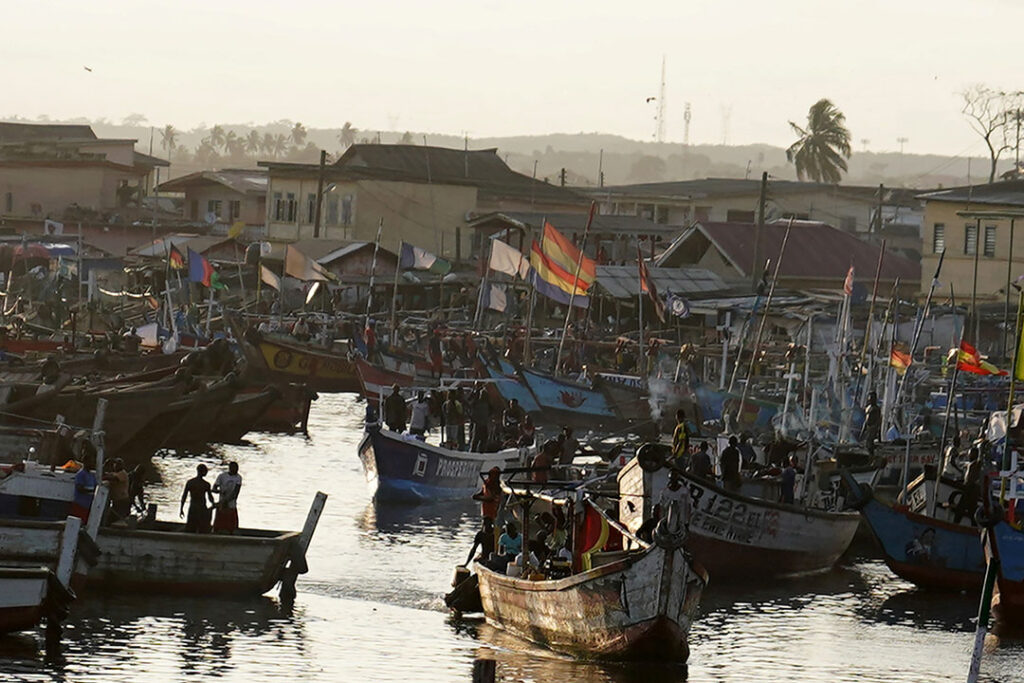ADF STAFF
Illegal fishing by large industrial trawlers in Ghana has decimated fish stocks to the brink of collapse and left small-scale fishermen with empty nets.
In Elmina, a coastal fishing town about 155 kilometers southwest of Accra, artisanal fishermen have had enough. Although Ghana’s government allows a maximum of 48 industrial trawlers in its waters, more than 70 were licensed as of July 2021.
“The key stakeholders, the canoe owners should be involved in the participation, in the decision-making, in the governance, and in the management of our resources,” fisherman Nana Kweigya told Deutsche Welle (DW).
Kweigya added that there are so many fishing vessels in Ghanaian waters that artisanal fishermen often return with only a basketful or two of fish after long hours at sea.
“The value is not even up to $10 or $20,” Kweigya said.
Ghana’s small pelagic fish populations, such as sardinella, have dropped 80% in the past two decades. One species, sardinella aurita, is fully collapsed. Over the past 15 years or so, the average annual income per artisanal canoe has dropped by up to 40%, according to the Environmental Justice Foundation (EJF).
Most of the money Ghana receives from industrial fishing is from licensing fees. The EJF has found that 90% of fishing vessels operating in Ghana are owned by Chinese companies, and it’s estimated that Ghana loses $50 million a year through opaque fishing agreements with foreign companies.
China is the world’s worst illegal, unreported and unregulated (IUU) fishing offender, according to IUU Fishing Index, and has targeted West African nations for decades.
“Fishermen can’t stand the competition,” Kweigya told DW. “It’s a livelihood matter. People must eat. We are competing with vessels within the [exclusive economic zone].”
In Ghana, fish provides 60% of animal protein consumed yearly, and its fisheries provide jobs for up to 3 million people, according to The Maritime Executive. More than 200 coastal villages in Ghana rely on fishing as their primary source of income.
Observers Under Threat
An EJF investigation showed that fisheries observers, who work for Ghana’s Ministry of Fisheries and Aquaculture Development, operate in unsafe environments as they try to monitor fishing.
Journalist Richard Kwadwo Nyarko told DW that he spent time aboard a Chinese fishing trawler and observed the crew using illegal fishing methods.
“They show [authorities] the right-size nets and as soon as they set off, then they use the unauthorized fishing net,” Nyarko said.
Nyarko also referenced fisheries observer Emmanuel Essien who went missing while aboard a Chinese vessel in July 2019 and hasn’t been seen since.
“If you’re an observer and you decide to go and do the right thing, you are frowned upon by the authorities who have played with them,” Nyarko told DW.
Besides using prohibited nets, industrial trawlers are known to use explosives and chemicals. They also engage is saiko, which is when an industrial trawler transfers its catch to a large canoe to disguise the origin of the fish. According to Nyarko, Ghanaian artisanal fishermen feel that saiko “is the thing that is causing a lot of havoc to them.”
In 2017, saiko practices were responsible for the loss of 100,000 tons of fish from Ghanaian waters, costing the country millions of dollars in revenue and threatening food security and jobs, according to the EJF.
Ghana was issued a “yellow card” in 2021 by the European Union, which concluded that the country’s level of development and engagement against IUU fishing was inadequate. A yellow card is a warning that sanctions may be imposed if the country does not improve its efforts to halt IUU fishing.
In response, Ghana signed a pact with Benin and Togo to implement a joint fisheries observer program aimed at reducing IUU fishing in the region. Ghana also urged neighboring countries to implement coordinated closed fishing seasons to preserve fish stocks.
Kwame Damoah, a consultant with Ghana’s Fisheries Commission, told DW that the country “has had a lot of regulations that are being implemented” to ensure that IUU fishing is addressed.

